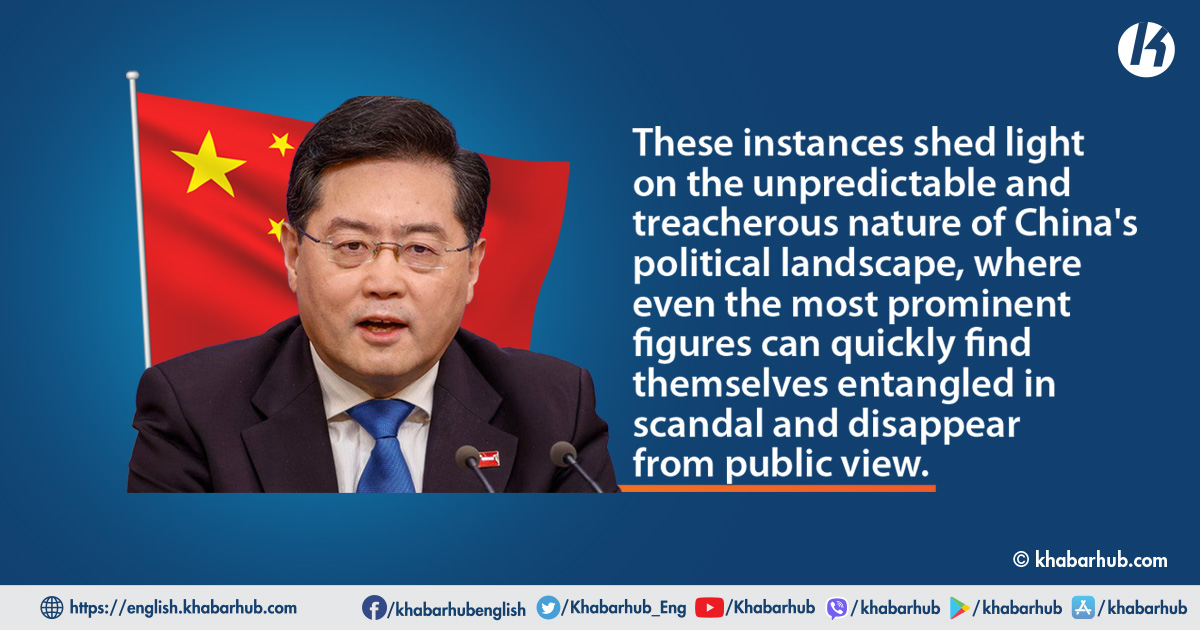In the complex world of international relations, significant events can disappear mysteriously, especially when hidden beneath the covert nature of China’s political system.
A mere five weeks ago, the world witnessed what appeared to be a significant event as China’s Foreign Minister, Qin Gang, engaged in high-stakes talks with the US Secretary of State, Antony Blinken, in Beijing.
However, those seeking information about this crucial meeting on China’s Foreign Ministry website are in for a bitter disappointment, as the entire encounter, along with every trace of Qin’s activities as foreign minister, has been utterly wiped from the records.
Qin’s six-month tenure as foreign minister also ended. Wang Yi is now the Minister of Foreign Affairs in China and is currently serving as the director of the Central Committee Foreign Affairs Commission.
Qin was seen as a close ally of Xi Jinping and is well-known in China’s foreign policy circles.
He held an important position as a former ambassador to the US. When he became the foreign minister last year, it surprised many as he got the role instead of more experienced candidates.
Censorship reached even popular social media app Weibo, where hashtags related to Qin’s removal were swiftly removed, even the cleverly disguised ones. On the other hand, hashtags about Wang’s appointment were allowed, but posts were filtered to show only content from verified accounts, suppressing user-generated comments.
This showed how much trust Xi Jinping had in him, prompting concerns about the former’s attempts to concentrate powers further.
As people continued to wonder, a new rumor emerged – some say Mr. Qin had a romantic relationship with a famous TV presenter.
The TV presenter suddenly disappeared from social media, which makes the rumors even more intense.
Even if this affair is true, it might not break any laws, but within the Communist Party, it could be seen as a violation of their strict rules.
This moral mistake, whether true or not, becomes a way for Qin’s rivals to damage his reputation and settle scores.
In the world of high-ranking Chinese officials, it is not uncommon for people to disappear from public view, only to resurface later after being embroiled in covert disciplinary investigations.
This pattern was evident in the recent downfall of Hu Jintao, Xi’s predecessor, whose exit was officially attributed to a brief illness, but his subsequent appearance at Jiang Zemin’s funeral suggested he hadn’t been entirely purged from the political scene.
Similarly, in November 2020, Jack Ma, a prominent Chinese billionaire, went missing for three months after criticizing China’s financial regulators, resulting in the cancellation of his company’s IPO.
He later resurfaced, adopting a lower profile. In 2015, Guo Guangchang, the chairman of Fosun International, also vanished, detained by the police in connection with a corruption investigation but was soon released.
Not just politicians and business figures face such predicaments, as exemplified by the unexpected disappearance of actor Fan Bingbing in July 2018, raising rumors of her fleeing or being under house arrest. Her eventual return revealed she had been fined an exorbitant amount for tax evasion.
Lastly, Bo Xilai, once a rising star and former Communist Party chief in Chongqing, faced a steep fall from grace, expelled from the Party, parliament, and set to face prosecution, while his wife received a suspended death sentence for the murder of British businessman Neil Heywood.
These instances shed light on the unpredictable and treacherous nature of China’s political landscape, where even the most prominent figures can quickly find themselves entangled in scandal and disappear from public view.
The lack of transparency and openness is worrying and leaves us questioning Xi Jinping’s role in creating this uncertain environment.
In Qin’s case, as news of the leadership changes emerged, China’s powerful machinery for controlling public discourse also sprang into action.
State media orchestrated a carefully crafted narrative to manipulate the information flow around these significant events.
Censorship reached even popular social media app Weibo, where hashtags related to Qin’s removal were swiftly removed, even the cleverly disguised ones. On the other hand, hashtags about Wang’s appointment were allowed, but posts were filtered to show only content from verified accounts, suppressing user-generated comments.
This systematic silencing and promotion reveal the extent to which the Chinese government goes to maintain control and project an image of invincibility.
The cases of high-ranking officials mysteriously disappearing, facing investigations, and then reappearing raise concerns about China’s political system under Xi Jinping’s leadership.
The secretive and unclear nature of these events makes one wonder about hidden motives and manipulation by those in power.
In addition, the control of public information in Qin’s case underscores the government’s efforts to maintain its authority and hide any dissent or criticism.
The lack of transparency and openness is worrying and leaves us questioning Xi Jinping’s role in creating this uncertain environment.









Comment